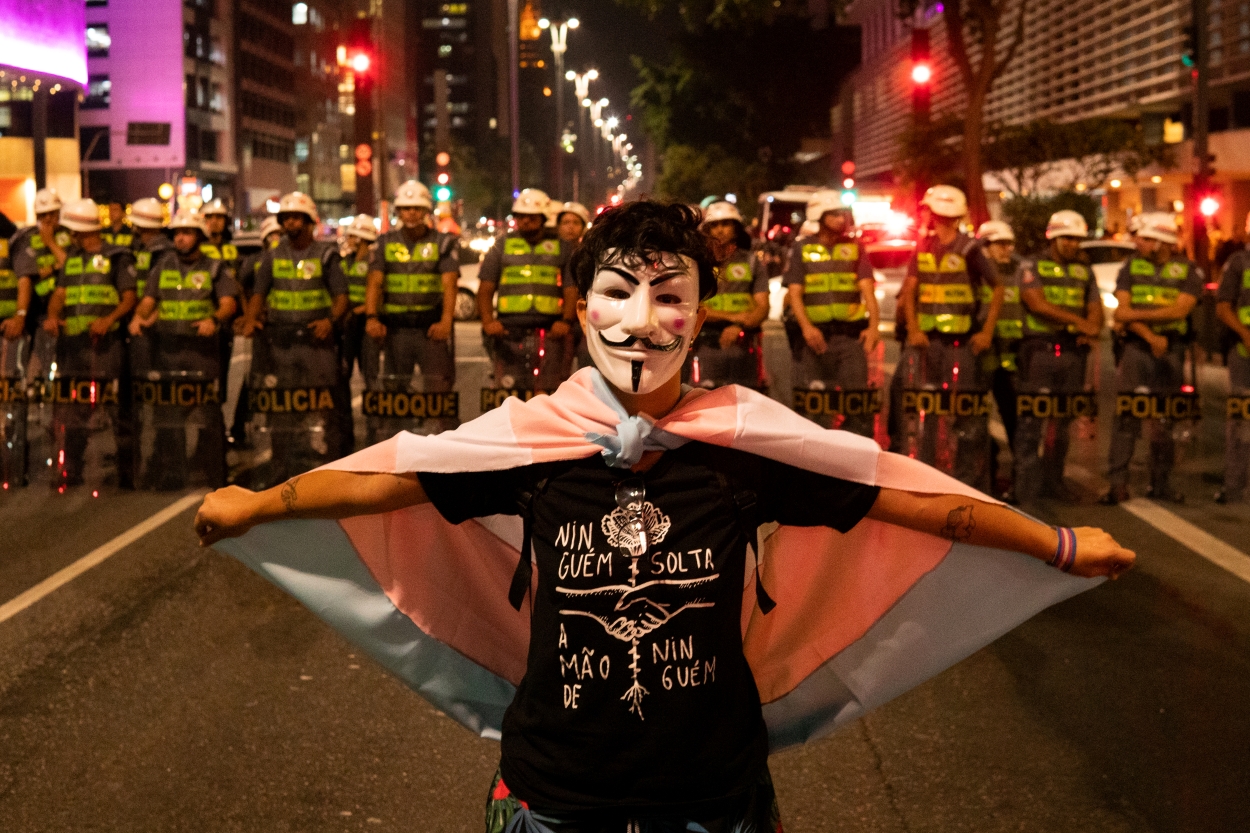BRASÍLIA – “Could it happen here too?”
During a recent trip to Brazil, this was the question on everyone’s lips – whether the violent protests seen in Chile, Bolivia, Ecuador and now Colombia might spread to terra brasilis. In some circles, the paranoia was immense. A government official told me some farmers in the border state of Mato Grosso are arming themselves, fearing “agitators” from Bolivia will invade and burn their crops. President Jair Bolsonaro’s son Eduardo, a congressman, raised the prospect of invoking a notorious dictatorship-era decree that allowed for indefinite arrest of dissidents, among other abuses, “if the left turns radical.” (After an uproar, he backed down.)
So – could it happen?
If we’ve learned one thing since this protest wave started in early October, it’s humility. Virtually no one saw Chile coming, for example. There’s something in the air in late 2019 – and not just in Latin America. The best strategy is to keep one’s eyes and mind open.
That said, Brazil did not feel to me like a country about to explode. In fact, it seemed calmer and less combustible than at other points in recent years. I spent a week visiting Brasília, Rio de Janeiro and São Paulo, and spoke to about 120 people from many walks of life – from street sweepers and bankers to government officials, retired military officers and customers at a bakery in Mooca, a working-class neighborhood of São Paulo. I do not pretend this was a scientific or fully representative poll; but I did try to talk to left, right and everything in between; and it is the kind of cross-section that has proven helpful in the past.
To tell the story, and provide a brief, imperfect overview of where Brazil stands in November 2019, I’ve selected five phrases I heard that, for different reasons, stuck with me:
1. É o que tem para hoje /// Bolsonaro “is what we have for today”
On Twitter, in the capital and in the media, Brazil appears profoundly polarized – a country of ever-escalating insults where everybody is obsessed with politics and blood feuds. Bolsonaro’s supporters engage in their daily fantasies of rewriting school textbooks or purging the Supreme Court; since his Nov. 8 release from jail, opposition leader Luiz Inácio Lula da Silva has held numerous rallies urging his supporters to follow Chile’s example. Former President Fernando Henrique Cardoso, age 88, told me: “The country hasn’t been this divided since 1964,” the year of the last military coup.
Pode ser. But outside of political circles, I heard much less anger and division than in 2016 or 2018, when Brazil was in the throes of an impeachment and an election, respectively, amid the worst recession in the country’s history. Today feels different. The quote above, which came from a retired salesman when I asked him about Bolsonaro, was delivered with a shrug rather than a sneer. “It’s a mess, but at least things aren’t getting worse” was a refrain I heard numerous versions of. My sense was that many Brazilians are tired after six years of nearly constant crisis, and grasping at a chance for normalcy.
This is not the same as saying people are happy – with their country or the government. Indeed, just 44% approved of Bolsonaro’s performance in a late September Ibope poll, compared to 50% who disapproved. (More recent, smaller polls had broadly similar results.) That’s the lowest approval on record for a Brazilian president in his or her first year. But it is also considerably higher than presidents in Chile (25%), Colombia (25%) and Ecuador (24%) when protests erupted there. The Ibope poll also showed 37% of Brazilians expected the rest of Bolsonaro’s government would be “good” or “great,” while another 27% thought it would be “ok.” Just 31% expected it would be “bad” or “terrible.”
And that’s the essence of it: Just enough progress seems to have been made in three areas critical to Brazilians today – the economy, corruption and street crime – for a majority to retain a fragile degree of faith, at least for now. I’ll talk more about those areas in a moment.
2. Todos estamos com medo /// “We are all afraid.”
This quote came from a member of civil society in Rio and reflects a very different reality: The utter terror felt by minority groups, poorer Brazilians, academics, journalists and others who oppose – or otherwise stand in the way of – Bolsonaro’s agenda.
The fear manifests itself in different ways. At universities, think-tanks and even some government ministries, it’s a feeling that anyone who deals in facts and evidence will be persecuted, just as Bolsonaro fired the head of the agency tracking Amazon deforestation in August. A great many people with connections abroad are searching for a way out; especially in Rio, where the assassination of city councilwoman Marielle Franco in March 2018 hangs heavy, and fear of retribution by pro-government militia groups is widespread. Many have already fled. “It’s an exodus,” one professor told me. “Those who remain are self-censoring.”
For those without such options, the situation is of course more grim. Bolsonaro famously said as a candidate that “The minorities have to bow down before the majority” – and it has proven a key operating principle of his government. Police brutality, which he promoted again and again throughout his career, is soaring – police have accounted for a whopping 30% of violent deaths in Rio this year, with most of them concentrated in lower-income areas.
If there is to be an explosion in Brazil, it could spring from these segments that feel threatened. Protests could break out on a campus, at a union or political event, or in reaction to another tragedy like that of 8-year-old Ágatha Sales Félix, accidentally shot to death by Rio police in September. The initial protest might even be somewhat small. But the common thread in Chile and Colombia was that authorities panicked, leading police and military to crack down even on peaceful demonstrations, which enraged the middle class and brought thousands more into the streets. Is it possible to imagine Bolsonaro and/or his like-minded allies in state governments making a similar miscalculation? Emphatically yes.
3. Não tem problema de segurança hoje em São Paulo /// “There’s no crime problem today in São Paulo.”
OK, this statement – courtesy of a taxi driver – isn’t even true. For the record, crime remains a severe problem in São Paulo and virtually all other Brazilian cities. But the exaggeration is itself telling: I’ve never, in nearly 20 years following the country, heard so many people voice optimism about falling violence. And indeed, many trend lines do seem headed in the right direction.
In the first seven months of 2019, homicides nationally fell 22.3% compared to the year before, according to government figures generally regarded as credible. That would be enough to merit celebration on its own. But auto theft also declined (-26.1%), as did cargo theft (-23.5%), bank robberies (-35.8%) and even sexual assault (-10.9%). In São Paulo state, where a quarter of Brazil’s population lives, the homicide rate now stands at just 6.25 per 100,000 people, the lowest on record – comparable to the U.S. average of 5, and well below the Brazilian national rate of about 28. Some cities in the northeast have also seen declines of 30% or more this year.
A separate war has erupted over why this is happening – and who deserves credit. Many security analysts say the main reason is a truce among Brazil’s biggest gangs, noting that homicides peaked in 2017 – before Bolsonaro took office – and have fallen since. But regardless, timing is everything in politics – and, deserved or not, the president gets some of his best marks in polls on his security policy (51%-45% approval/disapproval, per Ibope). This also explains why so many Brazilians are willing to turn a blind eye to police brutality of the kind cited above: They believe it’s working.
4. A corrupção deu uma melhorada /// “Corruption has gotten better.”
This is also a controversial assertion, but one I heard again and again, and not just from Bolsonaro’s strongest supporters. Corruption dominated national news in Brazil for many years, starting with the “Mensalão” case in Lula’s presidency and gaining steam when the Lava Jato scandal erupted in 2014. After years of seeing politicians and others hauled off to jail, the pace has slowed. As a result, there is a perception that Brasília today is at least somewhat cleaner. In a CNT/MDA poll in August, 31% of respondents called “the fight against corruption” the most successful area of Bolsonaro’s government – the #1 answer by a 10% margin over the second most-popular answer, crime policy.
Many argue that prosecutors and the Brazilian media have simply lost interest in digging up scandals now that Lula’s Workers’ Party and its allies are out of power. Others point to actions like Bolsonaro’s nomination of an “aligned” attorney general (to use the president’s term), shake-ups in leadership at the Federal Police and tax agency, and the effective neutering of the COAF (now called UIF) anti-money laundering agency, which together have significantly undermined the fight against corruption. Bolsonaro’s sons Flávio and Carlos may yet face a reckoning for a variety of scandals that could, if proven, damage the president (They deny all wrongdoing).
Time will tell if this continues to be an area of perceived strength for this government. But it must be said: Nothing brought Brazilians out on to the streets quite like corruption in recent years. If they keep perceiving progress, many are likely to stay at home.
5. Quem vai comprar nosso produto? /// “Who’s going to buy our product?”
Finally, this phrase, which came from a toy factory owner outside São Paulo, captures some of what’s happening in the economy.
There has been some good news – inflation has slowed to just 2.7%, which has in turn allowed interest rates to fall to their lowest level ever. Investment recovered in the second quarter, while unemployment has fallen by a percentage point since March to under 12%. But roughly two-thirds of the recent growth in employment appears to have been in the informal sector, as most companies simply refuse to aggressively create new jobs.
What’s holding them back? Above all, a lack of confidence – much of which stems from Brasília. Yes, the recent approval of pension reform helped the prevailing mood, at least among business leaders and market types. But the constant drumbeat of controversy and divisiveness coming from the president and his allies – whether it’s talk of leaving the Mercosur, the president ditching his party to create a new one, or attacks on independent institutions – has scared off many consumers and investors who wonder when, or if, a degree of normalcy might ever return. Consumer confidence fell sharply in November for the third straight month. The currency recently touched historic lows, while a net $21 billion left Brazil from January through October, a record pace.
“I see the good data, but I don’t see the calm necessary for people to start making purchases again,” the factory owner told me. “I just can’t answer the question – Who’s going to buy our product? Until then, I won’t create jobs, but I won’t cut them either.” In other words, Brazil’s economy is a bit like the country as a whole in 2019: Noisy, mediocre and disappointing, better than recent years in some areas, with a few reasons for genuine optimism – and perhaps just good enough overall to prevent a return to chaos.









